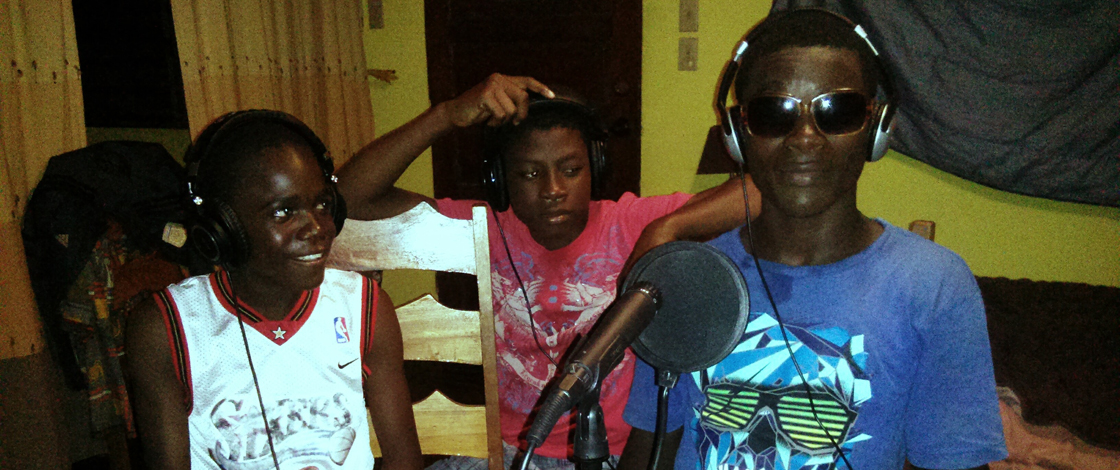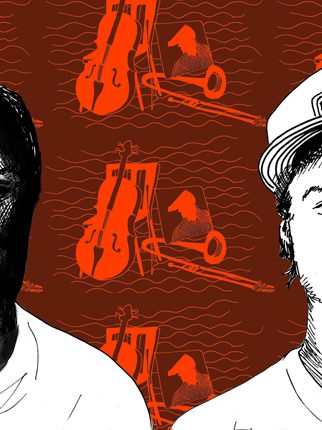Optimo, Youth Stand Up! and Their Ambitious Cultural Undertaking

A collaborative project that brings together new Scottish talent, young Garifuna players from Belize, and some young Ghanaian musicians from Tafi Atome, Youth Stand Up! is an ambitious cultural undertaking.
Initiated by Glasgow’s Green Door recording studio, with funding by Big Lottery Fund (a UK lottery fund that is connected to the Commonwealth Games and aids worthy cultural projects), Youth Stand Up! combines the desire to create some new musical and cultural exchanges, along with the intent to help set up recording studios, donate equipment, and offer workshops in both Belize and Ghana.
The project also has the support of JD Twitch of Optimo. Optimo was the name of a famous weekly party that ran at the Sub Club in Glasgow from 1997-2010. Taking its name from the Liquid Liquid song, it also became the group moniker for its two residents, JD Twitch and JG Wilkes. Optimo is one of the great DJ pairings of the past several decades, playing at a high level of sophistication and with riotous joy. Their DJ sets and parties at the Sub Club are the stuff of legend.
In recent years, in addition to his Optimo output, Twitch has established the Autonomous Africa label. The label’s purpose is to help aid in the establishment of an independent and self-governed Africa. Autonomous Africa has raised funds for Doctors Without Borders, as well as the Mtandika Mission, which provides education to girls in a large village in Tanzania. Autonomous Africa is about recognizing the breadth and complexity of African music, raising funds for specific areas and people, and pressing for a progressive agenda for the people of Africa, specifically helping to micro-finance projects while also raising awareness of how fiscal colonialism hamstrings efforts at self-rule and independence.
“I’m not so deluded to think that a record can change anything, but you start a process and help people get their own things going, and the results of that are bound to be positive.”
The results of the Youth Stand Up! recording sessions are out on Twitch’s Autonomous Africa label, featuring a terrific Twitch remix of “Come With Me,” with vocals by 11-year-old Belizean Leandra Ramos. A fundraising event will be held November 27 in Glasgow, featuring sets by JG Wilkes, Ghana Soundz, Golden Teacher and Sacred Paws. Proceeds from the album and the fundraiser all go toward the building of the recording studios and cultural centers.
I got a chance to have a chat with JD Twitch (aka Keith McIvor) and Green Door’s Emily Maclaren about the project and how they got involved in such an ambitious undertaking.
How did you come to be involved in the project and connect with the people at the Tafi Cultural 
Keith McIvor: My pals at Green Door made me aware of it. I have always liked Green Door’s commitment to working with youth and the number of after-school and teaching projects they have done. Emily had applied and gotten funding for this exchange between these three countries of the British Commonwealth—Belize, Ghana and Scotland.
Emily Maclaren: In 2012, we decided to offer a free after-school drum club for some young people in our community at Green Door, and several of us received grants to study drumming at the Kusun Cultural Centre in Accra [Ghana]. While we were there, I spent a few weeks traveling all over Ghana. One night, we were fortunate to be visiting the monkey sanctuary at Tafi Atome. They had a youth music group who were performing in the village that night, and my colleagues and I were mesmerized by their performance. We said almost jokingly that we wanted to do something with them, and we somehow were able to pull it off.
What have been some of the most difficult aspects of facilitating a project like this?
EM: I would say it’s been more time-consuming, rather than difficult. There were a lot of things I hadn’t realized until I was confronted with the practicalities of bringing a mobile recording studio overseas and, surprisingly, of trying to donate equipment to the youth groups. For example, we held a fundraiser last September and raised £1,200 to buy each group a multitrack recorder, microphones, monitor speakers, headphones, mic stands and cables, plus drum machines and a micro Korg synthesizer. Then we found out that in order to donate the equipment in Belize, they were going to charge us £600 import tax. So we had to try to contact the Minister of Tourism for Belize and write him a letter to ask him not to charge us. Of course, this all happened at the very last minute, before we were about to depart for Belize. It was stressful, but we got the duty waiver the day before we arrived!
There was also a very steep learning curve for the project. We are used to working in our mostly analog studio, with giant tape machines and an old vintage desk. There was no way we’d fit all that in the back of a tro-tro [Ghanaian taxi], so we had to go digital and confronted a few logistical challenges along the way: typhoon-like rain nearly flooding our makeshift studio, neighborhood kids running in and out of recording sessions all of the time, the perpetual sound of goats crying in the background in Ghana (which you can hear if you isolate any of the tracks), near-electrocution a few times. But we also had a lot of support from the mentor from Lebeha, Dorothy Patterson, and the mentor from Tafi Cultural Institute, Robert Egobeako. They provided a lot of help facilitating us in their respective countries.
KM: There were parts of songs being recorded in three different places, with three different levels of equipment, and then reassembled and mixed at Green Door. These were issues for Emily and her people; I came in at the end of this to add a remix and put the record out, so I was spared flooding and goats. Often when you have projects of extreme cultural fusion, it can go disastrously wrong; but I am happy with the way the songs hold together. There is a nice cohesion to the project, and credit is due to the musicians and Green Door for pulling it off.
What has been the most gratifying aspect of the project to date?
EM: How it sounds! When we first came up with the idea, we were thinking more about the process—how it might be fun to facilitate collaboration between the young musicians we work with in Glasgow and the young musicians we met in Belize and Ghana—than about what the final product would sound like. Everyone made such diverse and exciting contributions, it was difficult deciding what to use. We recorded much more material than is released, and there was a lot of great stuff in there. Our production team at Green Door each had our favorites we worked on, but we also did mixdowns of each other’s songs as well. There is a lot of diversity represented, but I’m proud it holds together as a complete album.
KM: Now that this is released, there is a sense of this chapter closing, but it doesn’t end the relationship. There will be future releases—this is an ongoing project for the musicians in each of the communities. When the studio is complete in Ghana, hopefully there will be additional recording done there, as well as in Belize and Glasgow. With the Autonomous Africa series, I want to call attention not only to the great music of Afro culture, but also to the people and communities and lives that are lived there. I’m not so deluded to think that a record can change anything, but you start a process and help people get their own things going, and the results of that are bound to be positive. We have to stop thinking of just our self-interests and also stop being short-term. What happens to one area ultimately affects everyone. If we engage and build rather than just retreat and consume, it’s only going to be better for us down the line.
Follow Optimo on Facebook | Twitter







